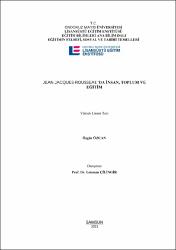Jean Jacques Rousseau'da insan, toplum ve eğitim
Künye
Özcan, Ö. (2021). Jean Jacques Rousseau'da insan, toplum ve eğitim. (Yüksek lisans tezi). Ondokuz Mayıs Üniversitesi, Samsun.Özet
Bu tez çalışması 18.yüzyılda ileri sürdüğü görüşlerle kendinden sonraki dönemlerde de etkili olan Fransız filozofu Jean Jacques Rousseau’nun insan, toplum ve eğitim anlayışını içermektedir. Tarihsel süreç içerisinde insanın konumunu inceleyen Rousseau toplumsallaşma süreciyle birlikte insanın doğal yapısındaki değişimin etkilerini, politik toplum ve eğitim ilişkisinde özgürlük sorunu üzerinden sorgulamıştır. Onun insan, toplum ve eğitim düşünceleri insan doğasından hareketle doğa durumu tasviri üzerinden açıklanmıştır. Bu bağlamda çalışmamız Rousseau’nun doğa anlayışı üzerinden insan insan ilişkisi, insan toplum ilişkisi ve insan eğitim ilişkisini ayrıntılı olarak incelemeyi amaçlar. Çalışmamızda Rousseau’nun insan hakkındaki düşünceleri ardından toplumsallaşma evreleri ve sözleşmeler düzeni, uygarlık süreciyle birlikte toplum ve eğitim görüşleri ele alınmıştır. Bu kapsamda Bilimler ve Sanatlar Üzerine Söylev, İnsanlar Arasındaki Eşitsizliğin Temelleri, Ekonomi Politik, Toplum Sözleşmesi, Anayasa Projeleri, Dillerin Kökeni, Emile, Yalnız Gezerin Hayalleri, İçimizde Gezinen Sessizlik, İtiraflar adlı eserler incelenerek, nitel araştırma yöntem ve teknikleri kullanılmıştır. Yaptığımız araştırma sonucunda insan, toplum ve eğitim anlayışında eşitsizlik temel bir sorun olarak ortaya çıkmaktadır. Rousseau’nun düşüncelerinde önemli olan özgürlük ve eşitliktir. Özgürlüğü insanın yaşam felsefesinin temel dayanağı olarak görür. Bu nedenle insan, toplum ve eğitim anlayışında insanın bütünselliğini özgürlük, eşitlik ve adalet kavramları üzerinden yapılandırmıştır. This thesis study includes the understanding of human, society and education of the French philosopher Jean Jacques Rousseau, who was influential in the following periods with the views he put forward in the 18th century. Examining the position of humans in the historical process, Rousseau questioned the effects of the change in the natural structure of the human being with the socialization process through the issue of freedom in the relationship between political society and education. His thoughts on human, society and education are explained through his depiction of the state of nature based on human nature. In this context, our study aims to examine in detail the relationship between human-human, human-society relationship and human education through Rousseau's understanding of nature. In our study, after Rousseau's thoughts about human, socialization phases and the order of contracts, together with the civilization process, society and education views were discussed. In this context, works such as Discourse on Sciences and Arts, Foundations of Inequality Between People, Political Economy, Social Contract, Constitution Projects, Origin of Languages, Emile, Lonely Wandering's Dreams, Silence Wandering Within, Confessions, were examined and qualitative research methods and techniques were used. As a result of our research, inequality in the understanding of human, society and education emerges as a fundamental problem. What matters in Rousseau's thinking is freedom and equality. It sees freedom as the basic foundation of human life philosophy. For this reason, he has structured the unity of humans in his understanding of society and education over the concepts of freedom, equality and justice.
















